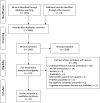Nut Consumption for Cognitive Performance: A Systematic Review
- PMID: 33330927
- PMCID: PMC8166568
- DOI: 10.1093/advances/nmaa153
Nut Consumption for Cognitive Performance: A Systematic Review
Abstract
Diet is considered an important modifiable lifestyle factor capable of attenuating early cognitive changes in healthy older people. The inclusion of nuts in the diet has been investigated as a dietary strategy for maintenance of brain health across the lifespan. This review aimed to present up-to-date evidence regarding the association between nut intake and cognitive performance. Four databases (Ovid MEDLINE, Scopus, Cumulative Index to Nursing and Allied Health Literature (CINAHL) Plus, and Embase) were systematically searched from inception to April 2020. Eligible articles were interventional or observational studies in humans aged ≥18 y that measured the effects (or association) of nuts (almond, hazelnut, macadamia, pistachio, walnut, pecan, pine nut, Brazil nut, cashew, peanut) on cognitive outcomes. Out of the 2374 articles identified in the searches, 22 involving 43,793 participants met the criteria and were ultimately included in this review. Memory (immediate and delayed), attention, processing speed, executive function, and visual-spatial ability, as well as risk of mild cognitive impairment, were the outcomes investigated. Lack of consistency across the studies regarding study design, types of nut used, and cognitive outcomes measured resulted in inconsistent evidence that the regular consumption of mixed nuts has a protective effect on cognition in adults of different ages. Nonetheless, we observed that studies targeting populations with a higher risk of cognitive decline tended to find a more favorable outcome. Furthermore, homogeneous findings were observed in the studies that specifically addressed the association between walnut consumption and cognitive performance: out of the 6 studies, including 2 randomized controlled trials, only 1 did not find a positive association.
Keywords: aging; cognition; dementia; diet; nuts.
© The Author(s) 2020. Published by Oxford University Press on behalf of the American Society for Nutrition.
Figures
References
-
- World Health Organization . World Report on Ageing and Health. Luxembourg: World Health Organization; 2015.
-
- WHO . Mental health. Dementia: a public health priority. Geneva: World Health Organization; 2018.
-
- Hedden T, Gabrieli JDE. Insights into the ageing mind: a view from cognitive neuroscience. Nat Rev Neurosci. 2004;5(2):87–96. - PubMed
-
- Scheltens P, Blennow K, Breteler MMB, de Strooper B, Frisoni GB, Salloway S, Van der Flier WM. Alzheimer's disease. Lancet. 2016;388(10043):505–17. - PubMed
Publication types
MeSH terms
Substances
LinkOut - more resources
Full Text Sources
Miscellaneous


